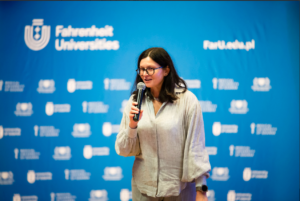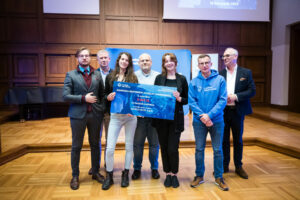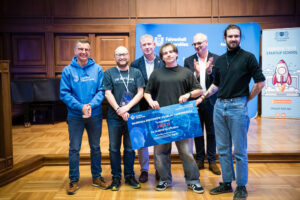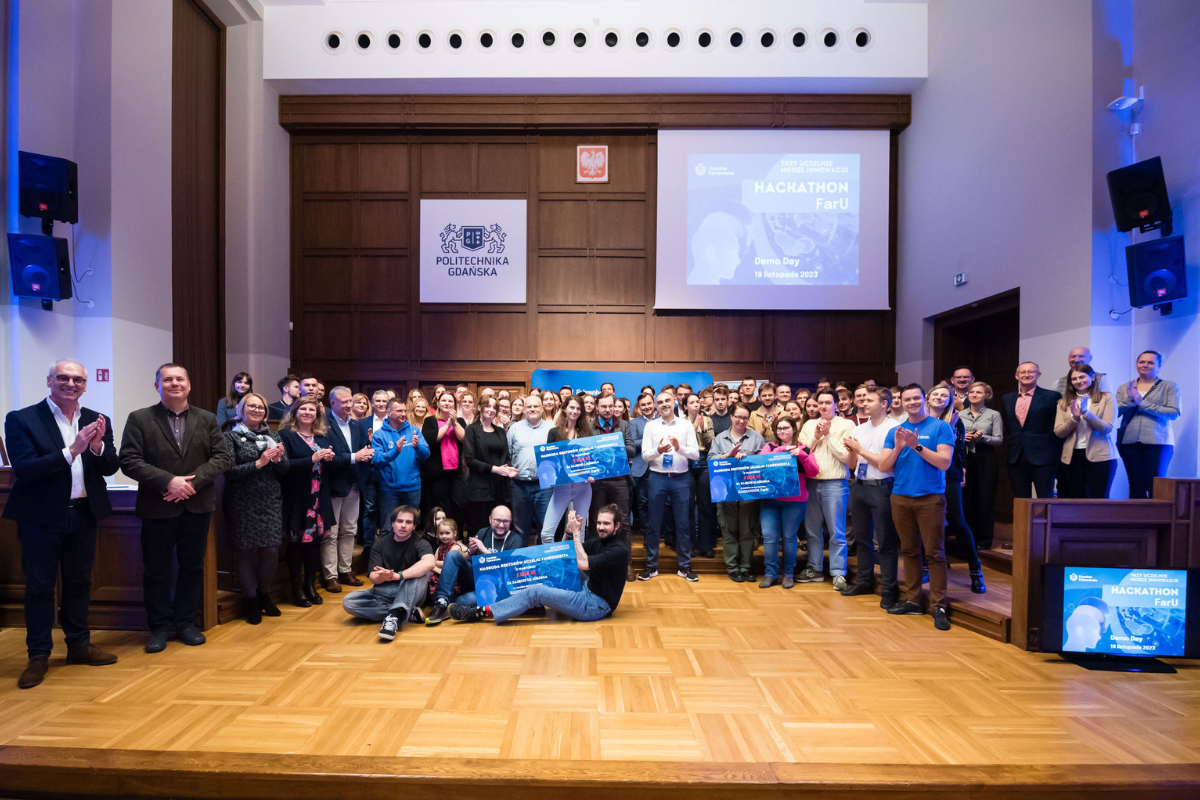17-19.11.2023 – 3 days of work, 5 thematic tracks, 15 interdisciplinary teams, coaches and experts. Fahrenheit Universities organised a hackathon for the first time to support entrepreneurship and idea development, as well as collaboration between UG, PG and GUMed.
All members of the Fahrenheit Universities were invited to participate in the event: research, teaching and administrative staff as well as PhD students and postgraduates.
 – We are meeting in the spirit of competition, but one that, on the one hand, improves competence and will drive development, but also enables greater cooperation and closer ties between the communities of our three universities. This is one of the main objectives of the Fahrenheit University,’ notes Professor Adriana Zaleska-Medynska, Director of the Daniel Fahrenheit University Association in Gdańsk.
– We are meeting in the spirit of competition, but one that, on the one hand, improves competence and will drive development, but also enables greater cooperation and closer ties between the communities of our three universities. This is one of the main objectives of the Fahrenheit University,’ notes Professor Adriana Zaleska-Medynska, Director of the Daniel Fahrenheit University Association in Gdańsk.
Academics from the three universities were able to get involved in a variety of ways: by working in teams, by joining a group of experts, and, while still in the preparation phase and co-creating the content of the event, by expressing their opinions in a survey conducted a few weeks before the event.
During the hackathon, participants worked to find a solution to a specific problem or issue within the areas:
- FarU and Pomeranian cooperation ecosystem,
- Civilisation Change,
- Energy and sustainable development,
- Food safety and quality, and
- FarU for the Sea.
The projects submitted had business potential, social potential or supported effective collaboration within the FarU.
The work was launched on Friday 17 November. It was inaugurated by Prof Krzysztof Wilde, Rector of the Gdansk University of Technology, host of the event. The first day also included a team-building outing, which benefited the most from the teams completed on the basis of individual applications.
On Saturday, participants gathered from as early as 8:00 and worked until late in the evening, with an agenda that included forum exercises, team time, and consultations with experts and mentors. This was a group of both academics and area and business practitioners, offering support in developing an idea, selecting methods or tools and preparing for the final presentation to the competition jury.
–We could both ask questions to a lady who works with business models on a daily basis, how we can better dress up what we want to do in a portfolio and price, and on the other hand we could talk to an expert from the Gdynia ports, who could bring us closer to the subtleties of the offshore industry, ‘ says one of the participants, Jakub Gnyp, representing the University of Gdańsk.
–I think that the hackathon is a good idea for all people who would like to experience new impressions and broaden their horizons with the business aspect ,’ says Janina Kowalik, a participant representing the Medical University of Gdańsk, ’ This is a body of knowledge that is hard to acquire as part of the compulsory course of study. Such a model of activities brought participants not only the benefits of acquired contacts and the ability to run a project in an interdisciplinary team, but also the verification of accepted hypotheses and the broadening of knowledge in the field of entrepreneurship.
The culmination of the intensive work was the Demo Day, i.e. the presentation of the developed concepts. Each team had three minutes to present their results in front of a jury and then answer insightful questions from its members.
The jury was composed of Prof. Adriana Zaleska-Medynska, Ph.D. (Director of the Daniel Fahrenheit University Association in Gdańsk), Ph. Małgorzata Grembecka (Head of the Chair and Department of Bromatology, Medical University of Gdańsk), Jacek Barański, PhD (Professor at the Institute of Energy, Gdansk University of Technology), Ewa Szymczak, PhD, Professor at the University of Gdansk (Deputy Dean for Education, Faculty of Oceanography and Geography, University of Gdansk), Wojciech Drewczyński (co-founder and CEO of the international accelerator Space3ac), and Michał Misztal (CEO of Startup Academy, which supports FarU in organising the hackathon).
The awards were presented to the winners by Professor Marcin Gruchała, PhD, Chairman of the Assembly of the D. Fahrenheit Association of Universities in Gdańsk, Rector of the Medical University of Gdańsk, Mariusz Kaczmarek, PhD, Vice-Rector for Education of the Technical University of Gdańsk, and Arnold Kłonczyński, PhD, Professor UG, Vice-Rector for Students and Quality of Education of the University of Gdańsk.
Awarded:
 First place went to the ‘SEA MATCH’ project submitted by physicists and mathematicians from the University of Gdansk. Laura Grzonka, Jakub Gnyp, Dagmara Kurkowska, Marciniak and Małgorzata Szczekocka developed mathematical models to optimise the design and construction of offshore wind farms.
First place went to the ‘SEA MATCH’ project submitted by physicists and mathematicians from the University of Gdansk. Laura Grzonka, Jakub Gnyp, Dagmara Kurkowska, Marciniak and Małgorzata Szczekocka developed mathematical models to optimise the design and construction of offshore wind farms.
In second place  was the ‘Green Plate’ project conceived by Amelia Dolińska (UG), Paulina Duch-Żebrowska (PG), Jakub Jabłoński, Kornelia Wilk and Krzysztof Ziółkowski from UG. The initiative involves the creation of a competence hub, supporting the modernisation of large-panel blocks of flats with increased energy and thermal efficiency in buildings.
was the ‘Green Plate’ project conceived by Amelia Dolińska (UG), Paulina Duch-Żebrowska (PG), Jakub Jabłoński, Kornelia Wilk and Krzysztof Ziółkowski from UG. The initiative involves the creation of a competence hub, supporting the modernisation of large-panel blocks of flats with increased energy and thermal efficiency in buildings.
III miejsce otrzymali autorzy projektu „DepressionControlApp”:
 Third place was awarded to the authors of the project ‘DepressionControlApp’: Szymon Bierzanowski (PG), Adrianna Czerwińska (PG), Krzysztof Pietruczuk (GUMed) and Wojciech Rusinek (UG). The app would be a comprehensive support for people struggling with depression, including biometric data analysis, the possibility to individualise therapy and quick contact to a help centre.
Third place was awarded to the authors of the project ‘DepressionControlApp’: Szymon Bierzanowski (PG), Adrianna Czerwińska (PG), Krzysztof Pietruczuk (GUMed) and Wojciech Rusinek (UG). The app would be a comprehensive support for people struggling with depression, including biometric data analysis, the possibility to individualise therapy and quick contact to a help centre.
Other projects:
- ABOSenior – a concept for tasty, balanced and cheap meals delivered straight from local bars to seniors. Team composition: Beata Chmiel, Szymon Jaskulski, Natalia Soldatke, Martyna Sudorów and Sandra Żukowska from UG.
- Accessibility Centre – a unit bringing together experts in the field of disability, providing support for students, academics and researchers alike. Team composition: Krzysztof Dąbrowski, Anna Modrzejewska, Jakub Modrzejewski-Szeląg, Dr. Eng. Paulina Strąkowska and Justyna Sudakowska from the Gdansk University of Technology.
- CyberSkills, a platform for generation X, building awareness and arming them with knowledge about online payment tools and online security. Team composition: Marcin Małas, Artur Mędrygał and Jan Tobolewski from PG and Kamila Mróz from UG.
- ECODIVE – a project using biomicrogels and water drones to clean the sea, without interfering with the natural underwater ecosystem. Team composition: Marina Galanina, Marcel Skierkowski and Paweł Tumialis from PG.
- FarU Connect – a solution that integrates the systems of three universities in a single application, facilitating access to necessary information and saving time for users of current portals. Team composition: Mateusz Chmielewski, Kamil Danecki, Wiktor Gawronski, Igor Stadnicki and Mikołaj Trzciński from PG.
- FarU Link, a response to the problems of the academic community in finding collaborators or accessing tools such as research apparatus. Team composition: Daniel Cieślak (PG), Michał Dominów (UG), Szymon Królak (PG) and Paulina Skrzypkowska (GUMed).
- H2Heat, an autonomous system to control the production and consumption of thermal energy, based on hydrogen solutions. Team composition: Filip Cesnowski, Gabriela Malyszko and Agnieszka Melerska from PG.
- Let’s connect – an application that integrates social networks and aggregates the functionalities of tools currently available on the market. Team composition: Konrad Nowicki, Przemysław Szumczyk and Artur Śpiewak from PG.
- MindTracker – an application that improves the quality of work and comfort of life through, among other things, biometric data analysis, assistant support (AI) or workflow and management tools. Team composition: Janina Kowalik and Katarzyna Połomska from GUMed and Maria Renke and Sathwik Prathapagiri from PG.
- ‘Scientific Fahrenheit ’ – a project to integrate the FarU scientific community by promoting events and joint research projects. Team composition: Łukasz Arcimowicz (UG), Barbara Boruch (PG), Dzmitry Dauhalevich (UG), Agnieszka Kalinowska (PG) and Rafał Kowalski (UG).
- Pack4U, or biodegradable, edible food packaging, responding to the needs and challenges of modern civilisation. Team composition: Agnieszka Bullmann and Wiktoria Jarosz from PG, Michał Klinikowski (GUMed), Agnieszka Kopczyńska (UG) and Milena Supernak (PG).
- StuddyBuddy – a comprehensive application supporting the student’s life inside and outside the university, e.g. in the area of tutoring and acquiring competences that increase competitiveness on the labour market. Team composition: Kacper Budniak, Kamil Schlagowski and Kamil Plewka from UG.
On behalf of the university, the participants were supported by experts:
University of Gdańsk: dr hab. Sylwia Mrozowska, prof. UG, Vice-Rector for Cooperation and Development; dr inż. Sylwia Badowska, Chair of Marketing, Faculty of Management; and dr hab. Dorota Burska, prof. UG, Chair of Chemical Oceanography and Marine Geology, Faculty of Oceanography and Geography.
GUMed: Agata Leśnicka, from the Department of Developmental Psychiatry, Psychotic Disorders and Old Age, GUMed, and Dr Anna Supernat, leader of the EIT HEI innovAId project, Department of Translational Oncology, Inter-University Faculty of Biotechnology, UG and GUMed;
Gdansk University of Technology: Alina Guzik, Chief Innovation and Development Officer, Faculty of Management and Economics; dr hab. inż. arch. Marek Wysocki, Prof. PG, Rector’s representative for accessibility; Paweł Filipkowski, Ph.D., Prof. PG, Department of Chemistry, Food Technology and Biotechnology, supervisor of scientific circles cooperating within the FarU; Anna Kuczyńska-Łażewska, Ph.D., Department of Energy Conversion and Storage, Faculty of Chemistry; Adam Inglot, Ph.D., Department of Geodesy, Faculty of Electrical Engineering and Automation; Sebastian Cygert, Ph. Sebastian Cygert, Chair of Multimedia Systems, Faculty of Electronics, Telecommunications and Informatics; Marita McPhillips, Ph.D., Faculty of Management and Economics; Marcin Łuczak, Ph.D., Prof. PG, Director of the Centre for Offshore Wind Energy, Institute of Shipbuilding, Faculty of Mechanical Engineering and Shipbuilding; and Arch. Dorota Kamrowska-Zaluska, Prof. PG, Department of Urban and Regional Planning, Faculty of Architecture.
The group of experts also included: Wojciech Drewczyński, co-founder and CEO of the international accelerator Space3ac, professionally connected with the investment department at the Black Pearls VC fund; Michał Daczuk, Project Manager, Port of Gdynia; Justyna Ratajczak, Managing Director of TBC Investment; Michał Gajda, project specialist at the Centre for Development Projects at the Warsaw University of Technology; and Bogna Lesner, patent attorney, expert in innovation and entrepreneurship support, involved in the implementation of innovation policy in the Pomeranian Voivodeship.
Photo: GREGMAR
fot. GREGMAR






